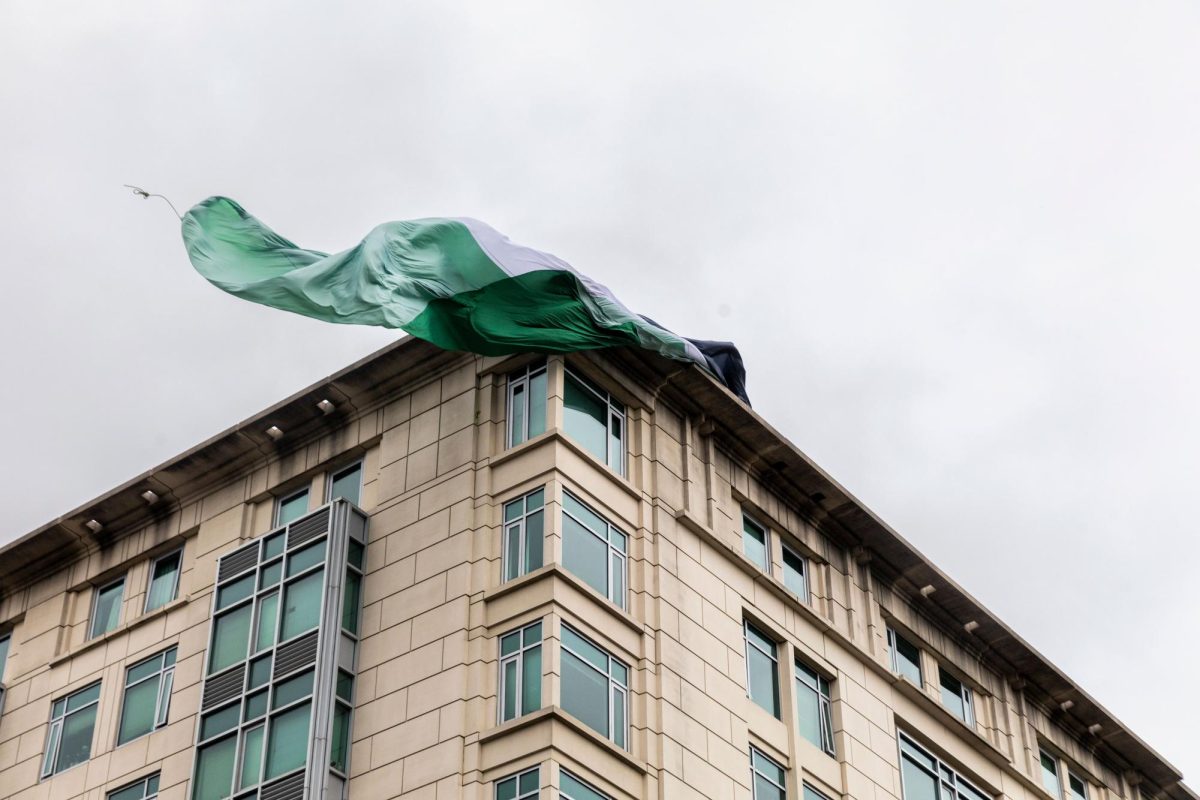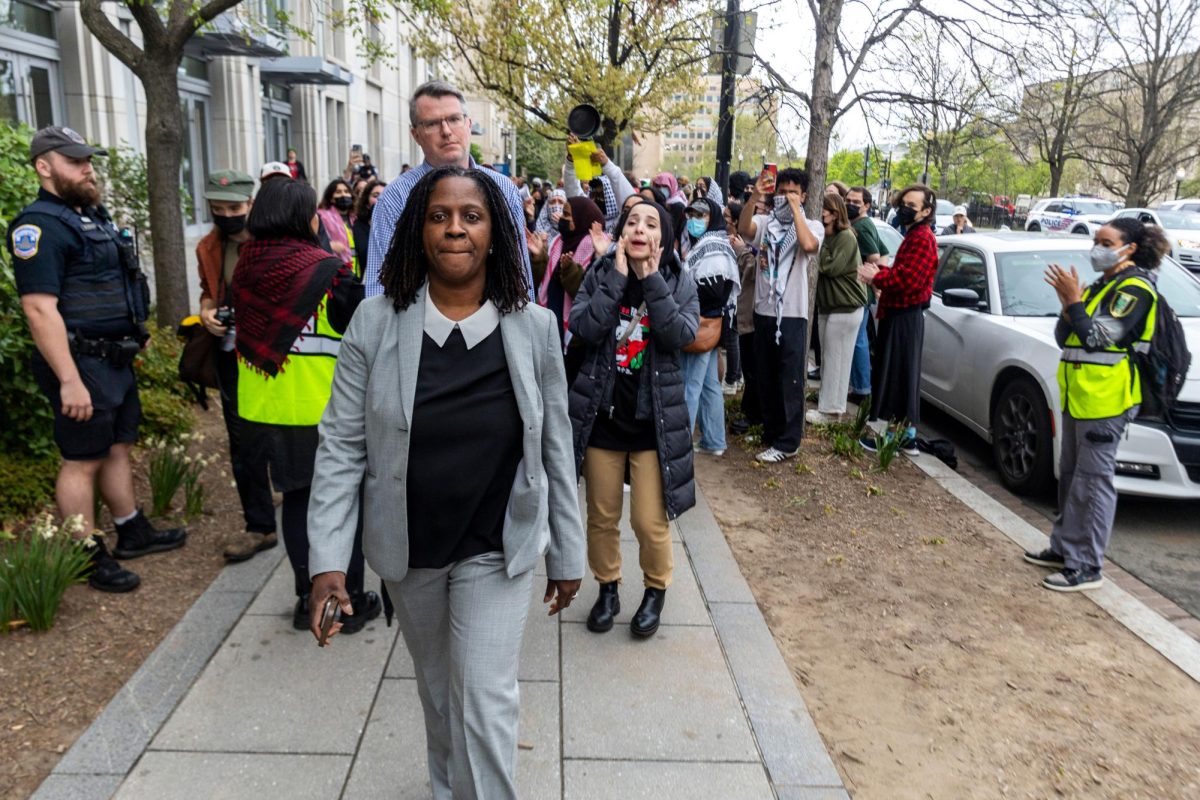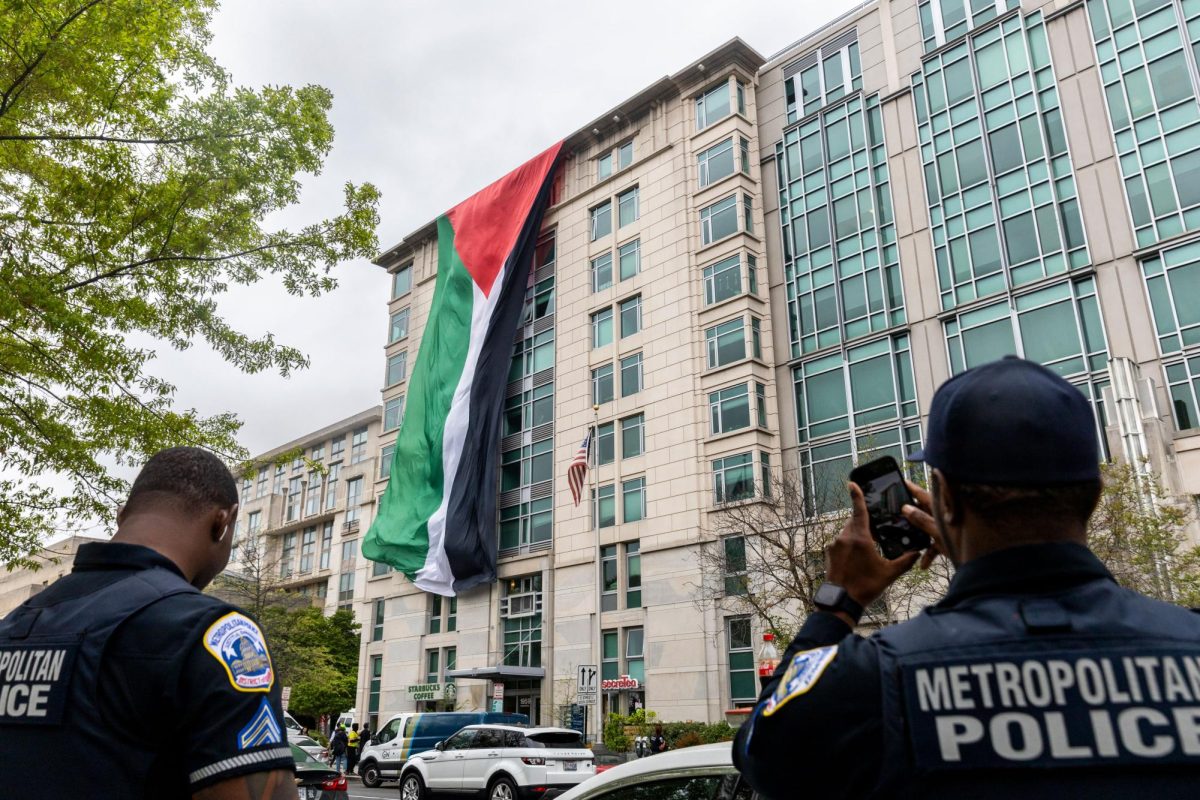More than 50 pro-Palestinian protesters condemned an event hosting the U.S. Ambassador to the United Nations at the Elliott School of International Affairs on Thursday.
The Student Coalition for Palestine at GWU led the protest of U.N. Ambassador Linda Thomas-Greenfield, who vetoed a series of resolutions demanding a cease-fire in Gaza and spoke Thursday at an event about diversity in international affairs. Shortly after Thomas-Greenfield began speaking, protesters outside hung a giant Palestinian flag from the roof of 1959 E Street — the residence hall next to the Elliott School — which stretched down seven stories of the building.
GW Police Department officers removed the flag after it sat draped for about five minutes.
Between October and February, Thomas-Greenfield vetoed three U.N. Security Council resolutions in support of a cease-fire in Gaza over concerns that a pause would allow Hamas to regroup, jeopardizing hostage negotiations. After Russia and China blocked a U.S.-backed cease-fire resolution last month, she abstained from voting on a final cease-fire resolution days later, allowing the resolution to pass.
Protesters gathered along the sidewalk of the Elliott School chanting “Linda, Linda, you can’t hide, you signed off on genocide” and “Linda, Linda, raise your hand, you kill kids on stolen land.” Protesters held signs that displayed statements like “Divest now, stop killing Palestinians,” and, “Every 10 minutes one child dies in Gaza … how will you spend your next 10 minutes.”
At least 33,000 Palestinians have been killed and more than 76,000 injured since the war began, according to the Gaza Health Ministry, and civilians living in northern Gaza are now facing famine.
University spokesperson Julia Metjian said the Palestinian flag violated the University’s poster policy, which prohibits students, faculty and staff from displaying any flags or banners on the outside of University property, so GWPD officers removed it. She said GW is committed to peaceful assembly if it does not impede access to University spaces, disrupt University activities, incite violence or violate University policy.
“The University is investigating this incident and will take further action in accordance with University policies as warranted,” Metjian said in an email.

The event, seven floors above the calls from students outside, aimed to celebrate the Generations Dialogue Project, an Elliott initiative to promote diversity in international affairs.
Thomas-Greenfield began her remarks by saying it was “novel” to be the subject of the demonstration because when she was a student, she was part of the crowds protesting for civil rights.
“In most cases in my own life, I’ve been out there as a protester,” Thomas-Greenfield said.
Inside the lobby of the building, at least seven demonstrators with red-painted hands held a white banner inscribed with the names of Palestinians killed in the war in Gaza.
The students told pedestrians about “a war criminal on the seventh floor” while passing out pamphlets with information about Thomas-Greenfield and the coalition’s demands to the University, including protecting pro-Palestinian speech and ending all academic ties with Zionist institutions.
The pamphlet states that Black people have been affected by systems of oppression since the founding of the U.S. and that the country has always used Black bodies as “puppets” to limit any resistance against the systems. It references historical examples like Black plantation overseers and Black FBI informants who infiltrated the Black Panther Party.
“For as long as we have been here, we have resisted these systems of oppression, but the United States of Amerikkka has always used Black bodies as puppets to carry out repression and dissent,” the pamphlet reads.
In an Instagram post advertising the protest Tuesday, the coalition listed about 18 organizations as cosponsors for the protest, including GW student and alumni groups and D.C.-wide chapters.
A student in the coalition, who requested anonymity due to safety concerns, said it is “shameful” and “disgusting” that GW invited Thomas-Greenfield to the event and said her vetoes blocked thousands of lives from being saved.
The coalition member declined to comment on the specifics of the placement and removal of the Palestinian flag.
“We chose to essentially mobilize around it to demonstrate that the GW student body does not stand for hosting war criminals on our campus,” the coalition member said.
GWPD Chief James Tate, Assistant Dean of Student Life Brian Joyce and Director of Campus Living and Residential Education Dan Wright stood inside the first-floor entrance of the school. At least seven Metropolitan Police Department officers and four GWPD officers were scattered throughout E Street and inside the Elliott School.
Thomas-Greenfield said she wants the protesters to know she hears their calls for a cease-fire and U.S. action in the Middle East. She said she empathizes with both sides affected by the war in Gaza.
“I’ve met with some of the Israelis who were taken hostage and I feel their pain,” Thomas-Greenfield said. “I have met with Palestinians and just listen to the terror and the horror that they have gone through and I feel their pain as well.”
Before reading audience-submitted questions, GDP undergraduate fellow Danielle Whyte — a junior international affairs student who moderated the Q&A portion of the event — asked Thomas-Greenfield if she believes marginalized people in power should be “dedicated to reducing marginalization systemically.”
“I think once you’re in a position of power, you’re no longer a marginalized person,” Thomas-Greenfield said in response.
Thomas-Greenfield said she receives criticism for her decisions as the face of the U.S. in the U.N. but has to balance her personal views by working for the government. She said she doesn’t regret any of the decisions she has made at the U.N., but at times feels “powerless” because it is difficult to reach diplomatic solutions.
“I don’t feel guilt in any way because I know that I have to be there as part of those who are trying to make a difference,” Thomas-Greenfield said.
Thomas-Greenfield said the U.N. does not reflect the “realities of today’s world” as a body that was established nearly 80 years ago. She said the council should expand the number of its permanent and non-permanent members.
“Do the five of us really represent the views of the world?” Thomas-Greenfield said, referring to the veto power of the U.S., China, France, Russia and the United Kingdom. “I think that’s a question that we know the answer to: we do not.”

Protesters crowded around Dean of Students Colette Coleman and her special assistant when they left the Elliott School more than an hour into the protest, with one protester clapping in her face and several chanting for her to quit her job.
Whyte said before the demonstration that Thomas-Greenfield’s veto votes are a “direct antithesis” of the GDP project because they support power structures that “contribute directly” to the oppression of people in Gaza. Whyte said Thomas-Greenfield’s recent UN votes “overshadow” her contributions to the GDP.
Whyte said the GDP’s undergraduate fellows cautioned the project’s leaders from inviting Thomas-Greenfield before the event, but that they hoped Thomas-Greenfield’s achievements in international politics would be the “focal point” of the event.
“If I was not a fellow, I’d be outside in the protest as well,” Whyte said.
GDP Principal Investigator Jennifer Brinkerhoff, a professor of public administration and international affairs, said before the event that her team was aware of the planned protest and worked closely with the ambassador’s staff to “stay focused” on the mission of the project.
“My deepest hope is that the statements that happen outside the building will be heard, will be noted, and then we can move on and focus on why we’re here for this project because this event is the culmination of five years of work towards trying to help young people,” Brinkerhoff said.





